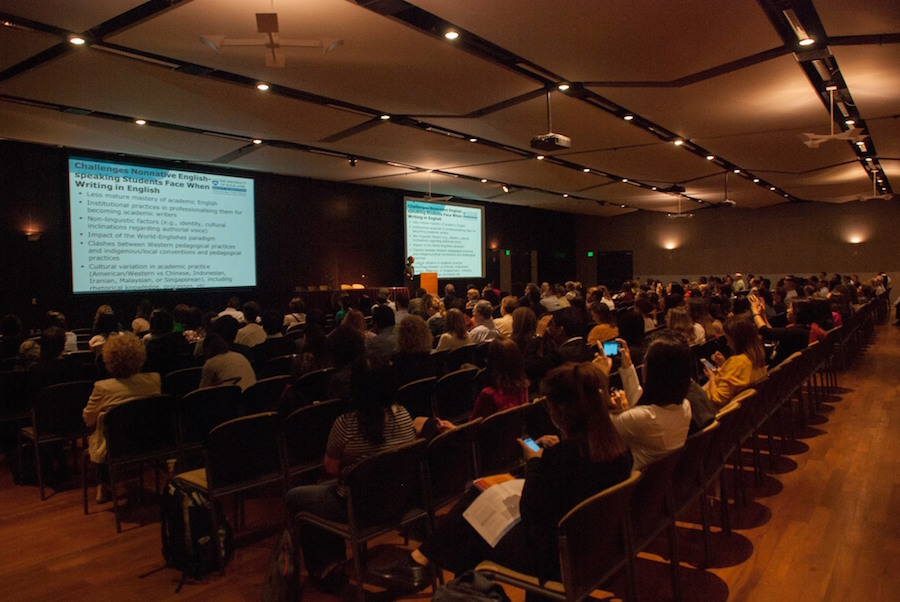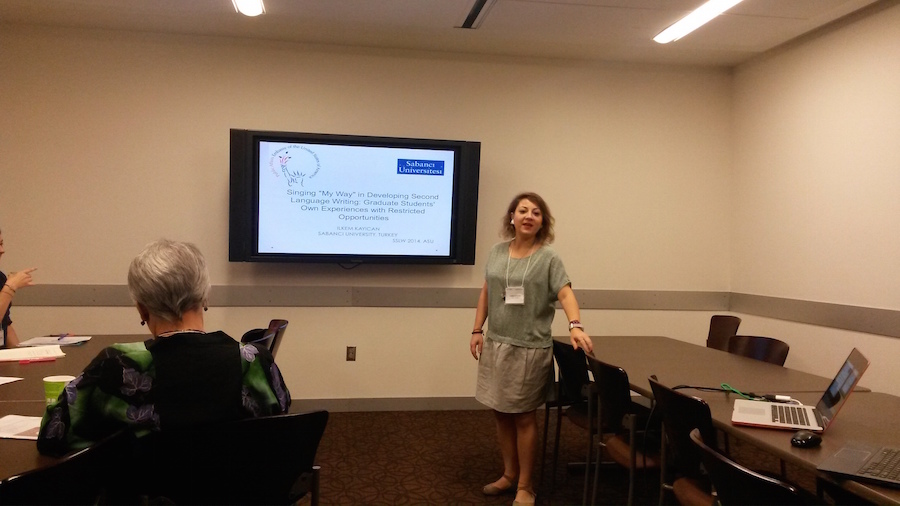Symposium on Second Language Writing
 Symposium on Second Language Writing
Symposium on Second Language Writing
Arizona State University 13-15 November, 2014
By İlkem Kayıcan
The Symposium on Second Language Writing (SSLW) is an annual international conference that brings together teachers and researchers who work with second- and foreign-language writers to discuss crucial issues in the field of second language writing. The SSLW began in 1998 as a way of facilitating the advancement of knowledge in the field of L2 writing and to build a sense of community among those who are involved in L2 writing research and instruction. The symposium addresses issues in theory, research, instruction, assessment, politics, and articulation with other disciplines.
This year’s theme of SSLW was “Professionalizing Second Language Writing”; for this reason it primarily addressed the topics of professional development of the field of second language writing, its relation to and interaction with other disciplines, professionalization of writing teachers, and the current state along with the future of second language research. Paul K. Matsuda, the chair of the symposium, said: “I invited speakers who could speak about the importance of building the field and also moving the field collectively by promoting professional development and engagement at many levels of professionalization.” For this reason the symposium gathered well-established professionals such as Dana Ferris, Tony Silva, Susan Miller-Cochran, Lawrence Jun Zhang, Dwight Atkinson, Deborah Crusan, and Christine Tardy
In order to address the key theme of the symposium, I conducted my research among graduate students in Sabanci University who completed their undergraduate studies at various universities in Turkey. My study aimed to find out the specific solutions that graduate student writers find to professionalize in their writing; by this way, the research would have the opportunity to uncover graduate student writers’ elusive methods and strategies that may not be explicit to academic writing professionals. I conducted 12 semi-structured interviews with graduate students; the interviews lasted minimum 30 minutes. Besides, I collected 18 responses from an online written questionnaire tool. Among those of 18, 12 of them were Turkish EFL writers. In the final stage I came out with 13 repeated patterns based on the responses to my questions and they are:
•General Belief: Academic writing is a personal exploration process/ it requires personal effort
•Reading good models and transferring the structure and language into their own writing
•Intensive Reading& Note-taking before writing
•Constant Writing Practice (Response Papers) (Most feel bad about not having been asked to write more often in their undergraduate courses )
•Students ask other friends to read and give feedback (These peers are mostly EFL, too)
•None EFL students used writing center
•Students created an e-mail cycle of successful peer paper samples among each other
•Low self-confidence is very common
•9 out of 11 interviewees find academic writing painful/ challenging
•Importance of teacher feedback- Both constructive and negative
•Self-editing (5 out of 11 after completing the writing process leaves their papers for a day and they revise and submit)
•Feel weak in vocabulary competency compared to a native writer
P.S. A common complaint: “I saw plenty of fancy academic vocabulary while reading, but I fail to remember and use them while writing my own paper, this reminds me all the time that I am a second language writer”
•Tendency to underrate their own authorship.
Based on this outcome I extended the research with a section called “lessons learned” because all the interviews and the informal conversations I had with graduate students taught me some lessons concerning the methods we applied in class and these are:
•Less input more practice- keep them write & revise
•Provide frequent and accurate feedback (primarily oral)
•Analyze good& bad models as part of course work in the classroom
•Let the students discover their own personal authorship earlier than planned. Assigning take-home writing tasks earlier in the course may be a remedy.
•Make them believe that academic writing itself challenging not only for non-native student writers and embrace the fact that it is more challenging for EFL student writers.
The conference organized in a way that allowed allocating as many research presentations as possible. There were 6 plenary sessions with nearly 250 concurrent presentations each lasted 20 minutes. Personally, although I thought it would be very difficult to run from one to another, they were very productive in the end. I attended nearly 20 sessions and chaired 3 of them. I was also a participant of an institute entitled “Designing and Sustaining a Satisfying and Successful Research Program in Second Language Writing”. The institute was led by Dana Ferris who is a prominent figure in Second Language Writing; she focused on the key factors such as “Design, Sustain, Satisfying and Successful” to prepare successful and promising researches. In line of these she explained “finding interesting research questions, how/where to find them, the correct replication methods based on previous studies, designing, and data collection with powerful justifications”.
Another interesting session was on “Dynamic Corrective Feedback”, it was really insightful since the study addressed the question if learning led to acquisition. Presenters applied this self-editing method among different levels of language learners in 10 week period. Although their aim was improving accuracy in students’ paragraphs, the results showed that their body paragraph organization also improved. If you are interested in the details of this type of feedback you could refer to “Effects of Dynamic Corrective Feedback on ESL Writing Accuracy” by James Harthshon in TESOL Quarterly.
When I heard there was a session on Online Machine Translators, I was very interested because I was always thinking about ways how to use them effectively in writing courses. This research was conducted among 22 Chinese students in a writing course in the USA accepting the fact that using online translators such as Google Translate was part of EFL students’ everyday life. The students were asked to translate an authentic Chinese text into English by an Online Machine Translator and the instructor led the students to compare it with a professional translation of the same text. This step aimed to allow students to see how Google Translate limits the authentic voice. However, the researcher suggested initiating a dialogue not to criticize EFL learners for using it, but guide them to show the literary use of online machine translators.
Among plenary talks the closest context to ours was Lawrence Jun Zhang’s from University of Auckland, New Zealand. The title of his talk was “Pedagogical Imports of Western Practices for Professionalizing Second Language Writing and Writing Teacher Education.”
Prof. Zhang as a non-native speaker himself centered his talk on Internationalization of English with “Emergence of New Englishes”. He addressed the increasing challenge for EFL writers and suggested the concept of Humanizing Language Teaching by relying on students’ L1 referring to researches by Qin& Karabacak (2011) and Schwartz (2014). He pointed out the handicap that the good-will of importing Western Practices in writing instruction clash with the indigenous conventions and practices. Therefore he suggested the concept of divergence in pedagogical practices by listing some methods to fulfil this.
 In general it was a very-well organized and field based, research and theory oriented symposium. Personally it strengthened my view that small conferences with a specific specialization end up with more useful insights and such organizations bear more potential to build stronger networks since you know that everybody is focusing on the same field with diverse approaches.
In general it was a very-well organized and field based, research and theory oriented symposium. Personally it strengthened my view that small conferences with a specific specialization end up with more useful insights and such organizations bear more potential to build stronger networks since you know that everybody is focusing on the same field with diverse approaches. Finally, I would like to thank very much to American Embassy Public Affairs and Sabanci University for their support in conducting my research.
For more information about the symposium you could visit the web-site: http://sslw.asu.edu/2014/schedule.html

